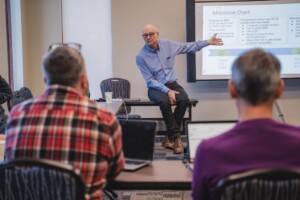Can Vermont Become a Regional Hub for Forest Innovation?
March 04, 2024

Jared Reynolds at the Vermont Forestry Accelerator thinks so, and he has a plan.
By Christine McGowan, Vermont Sustainable Jobs Fund
One of our country’s great legacy industries, the forest products industry hasn’t changed much in the past century. But that’s something Jared Reynolds, manager of the Do North Coworking and the Vermont Forestry Accelerator wants to change.
“We have this great opportunity to rethink innovation in a historic industry,” said Reynolds. “This region can be a hub for forest innovation.”

Jared Reynolds, manager of the Do North Coworking and the Vermont Forestry Accelerator in Lyndonville. Photo by Erica Houskeeper
One of Vermont’s legacy industries, the first sawmill was built in Westminster in 1739–more than 280 years ago. As paper mills around New England closed and overseas competition grew over the past few decades, what was once a thriving source of jobs and income, has become an industry struggling to define its role in today’s economy.
Where some see decline, however, others see opportunity. Vermont, along with other states around New England have the infrastructure–and the natural resources–to evolve and lead the country in sustainable forest practices that support a new kind of forest economy.
That evolution, says Reynolds, is important for both supporting existing industry and developing new markets. “It’s a complicated supply chain where foresters, loggers, and truckers depend on markets for the work they are doing. There needs to be some value or we will lose forestland to development.”
Innovation in the Kingdom
Enter Do North Coworking and the Forestry Accelerator in Lyndonville. Opened in 2018 as an initiative of Northern Vermont University, Do North was established to provide a shared work space for entrepreneurs in Vermont’s rural Northeast Kingdom. The Forestry Accelerator was launched in 2022 after market research conducted with the help of the Vermont Sustainable Jobs Fund found that the closest business accelerator dedicated exclusively to start ups in the forest products industry was in Europe. Now in its second year, the Accelerator taps into the region’s deep connections to the forest economy to provide support, connections, and funding for innovative new companies from around the country.
“It’s a unique program nationally that has generated a lot of attention in our rural corner of Vermont from national players,” said Reynolds. “Large corporations are seeing Vermont as a place where innovation is happening in the forest industry. That doesn’t exist anywhere else in the country.”
That’s important as Vermont explores emerging opportunities such as fiber textiles, mass timber, and advanced wood heat that have the potential to create important new markets for Vermont’s forest economy.
The Forestry Accelerator focuses on three areas: 1) products that use chips, resins, dust, and other byproducts of low grade wood; 2) technology that improves forest management, sales, operations, and safety; and 3) products and services that develop and improve advanced wood heat, fuels, and energy.

MontyChong-Walden, CEO of Calmura Natural Walls, presents his product at the 2023 Forest Accelerator in East Burke. Photo by Erica Houskeeper
In 2022, the first year of the accelerator, the program attracted mostly regional startups with products ranging from packaging materials made from wood shavings to a software platform that allows loggers to more easily connect with sawmills. This year’s cohort attracted entrepreneurs from the west coast and British Columbia–as well as Vermont–with more focus on green building materials.
“We have several companies that are developing modular solutions to housing challenges,” said Reynolds. “Another company is expanding markets for people selling firewood by helping them leverage e-commerce platforms. So, the innovation is all over the place–everything from a hard tech company that may end up needing $100 million to launch, to one that is developing software for everyday people in Vermont trying to sell firewood.”
Why Vermont?
“We obviously don’t have the resources of say, Vancouver or Portland, Oregon,” said Reynolds, “but in its own unique way, Vermont works.” The state’s size and commitment to the forest industry, says Reynolds, means that young companies have access to the deep industry expertise they need at this early stage.
“Individuals in our region have shown up and provided really valuable insight that has made this program successful,” said Reynolds. “That’s what these companies are looking for–expertise and guidance.”
Since many of the participating startups come from a business or entrepreneurial background, versus a forest industry background, perspectives from foresters and landowners have helped founders understand the markets they are entering. That is complemented by expertise coming from major regional and national corporations including Lyme Timber, Wagner Forest Management, Georgia-Pacific Ventures, and United Forest Product Industries.
“They are coming to Vermont, listening to presentations, and providing the critical feedback companies need at this stage to move forward,” said Reynolds. “They are looking at these promising, emerging companies that are determining the future of the forest industry and paying attention.”
The accelerator’s partnerships with Vermont State University and ecosVC are additional reasons for the program’s success. EcosVC facilitates the curriculum, which emphasizes developing a business case before jumping into a business model or financial plan. The rigorous approach, says Reynolds, is valuable because it’s tailored to the forest industry. “A lot of companies have done other accelerator programs, but haven’t gotten as much value because they follow a template that is really geared to software and tech companies,” he said. “Hard tech and manufacturing require a different approach. They need to understand their market, the value chain, and where to target their product at the outset, compared to a software company that can launch and then continue to iterate.”

Joeseph Steig, director at ecosVC, facilitates a discussion with participants at the 2023 Forest Accelerator in East Burke. Photo by Erica Houskeeper
As an entity of Vermont State University, Reynolds says that being part of a larger institution allows Do North to have more impact by engaging in issues like workforce development and accessing community-driven programming. “As we’ve started and grown, it’s been important to have that infrastructure,” said Reynolds.
Local Jobs, Global Impact
Ultimately, says Reynolds, the impact of the Forest Accelerator will be measured not just by jobs retained or created, but by the sustainability of healthy forests for generations to come. “It’s the nature of this kind of program,” said Reynolds, “that we won’t have tangible impact numbers immediately. We want to leverage this program in the Northeast Kingdom for economic benefit, but there is potential for much broader impact as well.”
That broader impact includes addressing workforce challenges in Vermont and the region, finding innovative new solutions, developing new markets for forest products, and maintaining forests as forests in the region. Reynolds believes that the program can help attract businesses to Vermont by building connections and showcasing the opportunity to start and grow here.
“We want to have impact here in Vermont while also nurturing these broader aspirations,” he said. As the program grows, Reynolds hopes to build up an innovation pipeline that encourages more Vermont companies to participate in the accelerator. He’d also like to support early stage ideas through an angel network that would provide investment and capital to promising companies. “This is a model other industries have used,” he said. “We can build on our own early success to replicate support for innovation in the forest economy.”
About the Vermont Forest Products Program at VSJF
Vermont’s forest economy contributes more than $2 billion in direct economic output and provides more than 13,000 jobs in forestry, logging, processing, specialty woodworking, construction, wood heating, maple production, and forest-based recreation. The Forest Products Program at the Vermont Sustainable Jobs Fund (VSJF) creates space for strong relationships and collaboration throughout the industry and promotes the development of new and existing markets for Vermont wood products. Committed to nurturing the sustainable development of Vermont’s economy, VSJF provides business assistance, network development, strategic planning, and value chain facilitation in agriculture and food system, forest products, waste management, renewable energy, and environmental technology sectors. Learn more at www.vsjf.org.
Read More Stories Like This:
- Vermont Natural Forest Products Sees Potential in Pellets
- Next Gen Wood-Based Textiles Offer Northern Forest Market Development Opportunities
- Curious About a Career in the Forest Economy?
- Fairbanks Museum Home to Vermont’s First Demonstration Mass Timber Building
- Family, Forest at Heart Center of Katie Babic Designs




